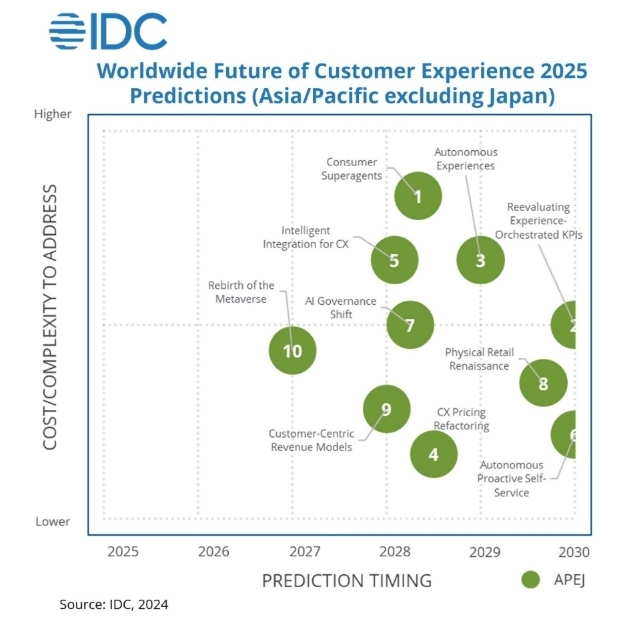AI-Driven CX: The Transformative Role of AI in Elevating Customer Experience
In today’s competitive business environment, the integration of artificial intelligence (AI) in customer experience (CX) has become indispensable. According to IDC, AI not only provides highly personalized experiences but also helps businesses stand out in the crowded marketplace.
Abhishek Kumar, Associate Research Director of IDC Asia/Pacific, highlights the significant role AI plays in driving tech-driven CX enhancements. He explains that businesses in the Asia-Pacific region face the challenge of improving operational efficiency while navigating commoditized markets with indistinguishable products and services. To address this, many companies are turning to AI.
AI serves as a catalyst for modernizing and unifying data infrastructures, thereby eliminating existing silos. This shift enables a more cohesive, experience-oriented approach that benefits all stakeholders, including customers. Consequently, organizations can redefine their CX strategies to deliver meaningful value.
The AI Pivot in Customer Experience
Integrating AI into every business operation is not just a strategy; it is a necessity. By doing so, companies can remain competitive, adapt to changing markets, and grow. Moreover, the latest IDC report sheds light on the evolving relationship between AI and CX. These insights emphasize that organizations must prioritize tapping into AI’s vast potential to reshape the future of CX.
IDC has outlined several predictions regarding the future of CX in the Asia-Pacific region. These forecasts reveal how businesses will redefine their strategies to thrive in a tech-driven economy.
Key Predictions for CX in the Asia-Pacific Region
CX Pricing Refactoring
By 2028, IDC predicts 40% of CX vendors will adopt new, outcome-based pricing models. This shift will make value exchanges more transparent for clients and improve AI monetization. The transition to outcome-focused pricing will further strengthen partnerships between businesses and customers.
AI Governance Transformation
Another significant change involves the governance of AI. By 2028, 25% of CX teams will replace human-in-the-loop approaches with dedicated AI governance roles. This shift will not only optimize AI implementations but also streamline processes.
Customer-Centric Revenue Models
IDC predicts that by 2028, 30% of A2000 companies will restructure their customer-facing teams. They will align these teams under a Chief Revenue Officer (CRO) to optimize CX outcomes. Companies will realize the importance of referral growth and cost control, which will drive this alignment.
Autonomous Proactive Self-Service
As AI matures, IDC expects 20% of B2C A2000 companies to leverage real-time IoT-product data by 2030. This advancement will allow companies to notify customers of potential failures, provide resolution recommendations, and enable proactive self-service solutions.
The Path to AI-Driven CX Success
To unlock AI’s full potential in CX, organizations must adopt a comprehensive approach. This requires them to integrate AI into core operations, enabling personalized experiences for customers at scale. Additionally, businesses must modernize IT systems to support AI-driven initiatives effectively.
Transitioning to AI-powered CX models requires businesses to embrace innovation. As organizations implement new AI strategies, they must also ensure seamless collaboration between IT, operations, and customer-facing teams. A unified approach can bridge gaps and improve overall customer satisfaction.
AI’s Role in Breaking Silos and Enhancing Collaboration
One of the most critical aspects of AI adoption in CX is its ability to unify organizational data. Breaking down silos ensures that teams across departments can access and analyze data collaboratively. This integration leads to better decision-making and more cohesive customer journeys.
Moreover, AI facilitates personalized interactions by analyzing customer data and predicting needs. This predictive capability allows businesses to deliver tailored solutions, improving loyalty and trust.
Challenges in Implementing AI for CX
Despite its immense potential, implementing AI in CX is not without challenges. Businesses often struggle with outdated IT systems and organizational resistance to change. Additionally, ensuring data privacy and compliance remains a top priority for companies adopting AI.
To overcome these obstacles, organizations must prioritize education and training. By equipping teams with the necessary skills, businesses can ensure smooth AI implementation. Furthermore, adopting transparent governance frameworks can help address privacy concerns.
The Road Ahead: Building a Resilient CX Strategy
The integration of AI into CX strategies is a journey, not a destination. As businesses continue to explore AI’s capabilities, they must remain agile and adaptable. IDC’s predictions provide a roadmap for companies to navigate this transformation successfully.

Ultimately, businesses that prioritize AI-driven CX will not only enhance customer satisfaction but also achieve long-term growth. In fact, by adopting a forward-thinking approach, companies can unlock new opportunities and redefine success in the digital age.
